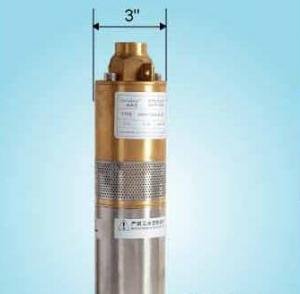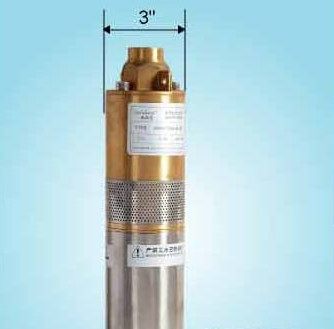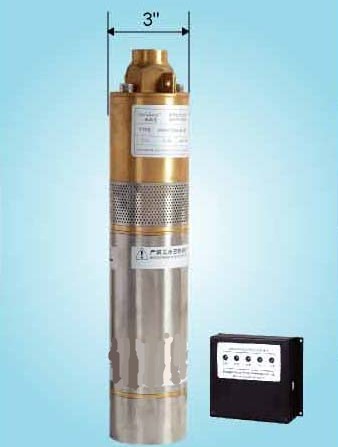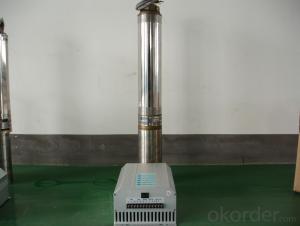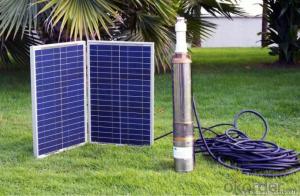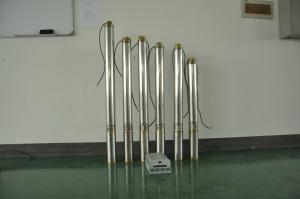1 Hp Solar Pump Price | Long Service Life Solar Pump SHP 6/105-300
- Loading Port:
- Shanghai
- Payment Terms:
- TT or LC
- Min Order Qty:
- 1 unit
- Supply Capability:
- 10000 unit/month
OKorder Service Pledge
OKorder Financial Service
You Might Also Like
Solar Pump is a pumping device powered by solar energy, which consists of solar pumping inverter and pump, and is mainly applied to agricultural irrigation, desert control, pasture animal husbandry, city waterscape, seawater desalination and fresh water supply, etc.
Features: High efficiency& High reliability
Driven by PM. Brushless DC Motor
Minimum maintenance, long life& without watching
Powered by PV/Wind/Battery
All the necessary production
Environment friendly materials, lubricate without oil
Applications:
Village or family water supply
Animal drinking water and lives tock watering
Garden/Countryard Irrigation
Natatorinm/swimming pool
Water supply for bivouac or camping car
Water supply for remote areas
Automatic Control:
Operate automatically & without watching
Protected from dry operation
Maximal Power Point Tracking (MPPT)
Protected from dry operation
New Technology
Application Innovation
The DC PM brushless motor has increased its efficiency up to 25% in comparison with traditional small asynchronous motor-25% PV Modules could be saved.
Technology Innovation(Patent)
Stator and rotor are sealed by environment friendly casting resin. The motor’s insulation resistance can be hold higher than 300MΩ, for more than 10 years. I t consumedly increased the security and reliability of the submersible motor.
Structure Novelty
Casting resin technology processed stator and rotao as well as the water lubricated bearing make the submersible pump environment friendly(no even one glob oil), easy to install and more reliability.
Solar Pump Specifications
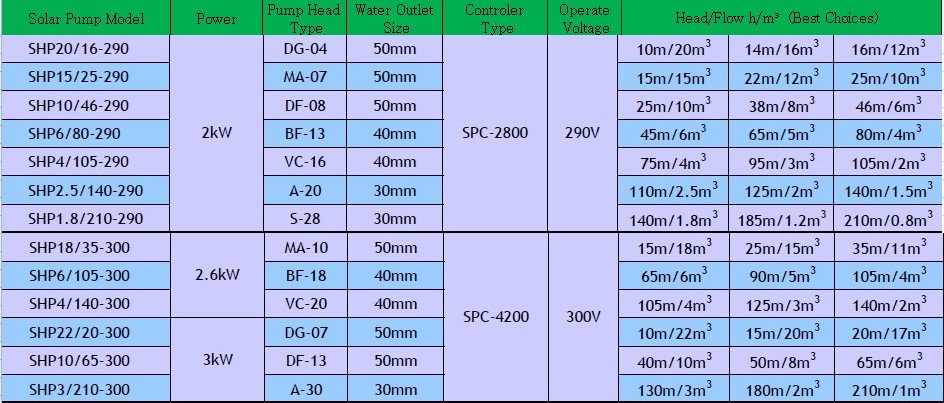
- Q: Can a solar pump be used for irrigation in hilly or sloping terrains?
- Yes, a solar pump can be used for irrigation in hilly or sloping terrains. Solar pumps are versatile and can be installed in various locations, including hilly or sloping terrains. These pumps use solar energy to power them, which means they do not require a connection to the grid or fuel to operate. This makes them highly suitable for remote and challenging terrains. Additionally, solar pumps can be installed at different levels to cater to the varying terrain, ensuring efficient water distribution across the slope. They can provide a sustainable and environmentally friendly solution for irrigation needs in such terrains, reducing the reliance on conventional energy sources and minimizing the carbon footprint.
- Q: Are solar pumps more cost-effective than traditional pumps?
- Solar pumps are a more cost-effective option compared to traditional pumps. Despite the higher initial investment, solar pumps have significantly lower operating costs throughout their lifespan. By utilizing renewable energy from the sun, solar pumps eliminate the need for expensive electricity or fuel, which can be subject to price fluctuations. Moreover, solar pumps require minimal maintenance and have a longer lifespan, resulting in reduced replacement and repair expenses. Additionally, solar pumps often qualify for government incentives and subsidies, further reducing the overall cost. The cost-effectiveness of solar pumps is particularly evident in areas with abundant sunlight, making them a reliable and cost-efficient solution for water pumping, especially in remote or off-grid locations.
- Q: Can a solar pump be used in agricultural applications?
- Certainly, agricultural applications can indeed make use of a solar pump. For farmers seeking water for irrigation, solar pumps offer a sustainable and cost-effective solution. These pumps operate on solar energy, which is both abundant and renewable. They have the ability to extract water from diverse sources, including wells, boreholes, rivers, and lakes, ensuring a dependable and steady water supply for crops. Furthermore, solar pumps are simple to install and demand minimal upkeep, rendering them a practical choice in agricultural settings. Moreover, incorporating solar pumps in farming aids in diminishing carbon emissions and lessening reliance on fossil fuels, which contributes to a more eco-friendly farming approach.
- Q: What is the required voltage for a solar pump?
- The required voltage for a solar pump can vary depending on the specific model and application. However, most solar pumps operate using a low voltage direct current (DC) power source, typically ranging from 12 to 48 volts.
- Q: What is the expected lifespan of the motor in a solar pump?
- The expected lifespan of a motor in a solar pump can vary depending on various factors such as the quality of the motor, maintenance practices, and environmental conditions. However, on average, a well-maintained motor in a solar pump can be expected to last between 15 to 20 years.
- Q: Can a solar pump be used in areas with limited access to skilled technicians?
- Yes, a solar pump can be used in areas with limited access to skilled technicians. Solar pumps are designed to be simple, easy to install, and require minimal maintenance. They are often equipped with user-friendly features and instructions, allowing even those with basic technical knowledge to operate and maintain them. Additionally, solar pumps have fewer mechanical components compared to traditional pumps, reducing the chances of breakdowns and the need for specialized expertise. Thus, they are an ideal solution for areas with limited access to skilled technicians.
- Q: Are there any specific certifications or standards for solar pumps?
- Yes, there are specific certifications and standards for solar pumps. Some commonly recognized certifications include the International Electrotechnical Commission (IEC) 62109-1 for safety of power converters, and the International Organization for Standardization (ISO) 9001 for quality management systems. Additionally, there are various regional and national standards that may apply, depending on the country or region where the solar pump is being used. These certifications and standards ensure that solar pumps meet the required safety, performance, and quality criteria.
- Q: Are there any limitations to the flow rate of water a solar pump can handle?
- Yes, there are limitations to the flow rate of water that a solar pump can handle. The flow rate is dependent on factors such as the size and capacity of the pump, the power output of the solar panels, and the available sunlight. If the solar pump is not appropriately sized or powered, it may struggle to handle higher flow rates. Additionally, factors like the distance the water needs to be pumped and the elevation can also impact the flow rate capabilities of a solar pump.
- Q: Can a solar pump be used for hydroponics or greenhouse irrigation?
- Yes, a solar pump can be used for hydroponics or greenhouse irrigation. Solar pumps are a sustainable and efficient option for providing water to these systems, as they utilize energy from the sun to power the pump. This makes them environmentally friendly and cost-effective, reducing the reliance on traditional electricity sources. Additionally, solar pumps can be easily integrated with automated systems, allowing for precise control and efficient water distribution in hydroponics or greenhouse setups.
- Q: Can a solar pump be used for geothermal heating and cooling systems?
- No, a solar pump cannot be used for geothermal heating and cooling systems. Geothermal systems require specialized pumps designed to handle the unique requirements of extracting heat from underground sources, while solar pumps are primarily used for circulating water in solar water heating systems or for irrigation purposes.
1. Manufacturer Overview
| Location | |
| Year Established | |
| Annual Output Value | |
| Main Markets | |
| Company Certifications |
2. Manufacturer Certificates
| a) Certification Name | |
| Range | |
| Reference | |
| Validity Period |
3. Manufacturer Capability
| a) Trade Capacity | |
| Nearest Port | |
| Export Percentage | |
| No.of Employees in Trade Department | |
| Language Spoken: | |
| b) Factory Information | |
| Factory Size: | |
| No. of Production Lines | |
| Contract Manufacturing | |
| Product Price Range | |
Send your message to us
1 Hp Solar Pump Price | Long Service Life Solar Pump SHP 6/105-300
- Loading Port:
- Shanghai
- Payment Terms:
- TT or LC
- Min Order Qty:
- 1 unit
- Supply Capability:
- 10000 unit/month
OKorder Service Pledge
OKorder Financial Service
Similar products
Hot products
Hot Searches
Related keywords
